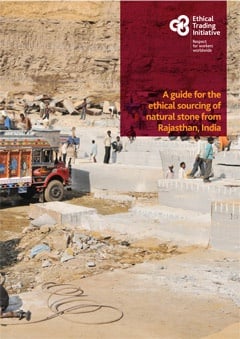The Ethical Trading Initiative (ETI) has published a new guide for companies buying sandstone paving from Rajasthan, India, on the ethical issues involved.
Most concern has focused on major issues such as child and bonded labour in the quarries and stone processing factories.
The Sandstone Working Group of the Ethical Trading Initiative (ETI), which comprises UK hard landscaping material suppliers, is trying to improve the conditions of stone workers in Rajasthan, where most of England's natural stone paving comes from.
A programme to work with the suppliers towards improving the conditions of workers in stone processing factories first and then moving back along the supply chain to the quarries was established by the ETI in 2013 (you can read the NSS report on the launch event here).
The ETI is working with its members to promote the business and human rights agenda in Rajasthan’s sandstone sector and part of this programme involves developing tools and guidance that support industry and help to catalyse change.
That is what the new ethical sourcing guide is for. There are also publications covering grievance mechanisms and legal reviews, which can be downloaded from the ETI website here.
There is a further leaflet on silicosis, which is one of the most serious healthcare issues for workers in the sandstone sector in the UK, where protective masks and dust extraction is used, let alone in Rajasthan, where it isn't.
The ETI says its Rajasthan sandstone programme does not set out to tackle child labour and bonded labour specifically, but rather to promote the business and human rights agenda in Rajasthan’s sandstone sector.
"We are working mainly in the first tier at the moment (stone processing yards) around occupational health and safety and employment practices, with plans to extend this to quarry level," says ETI Communications Manager Esme Gibbins.
"A big focus is on building capacity within the local industry to address human rights issues, and the workplace grievance mechanisms form a key part of this. Our overarching goal is a sustainable local sandstone sector that promotes good practice and has the right systems in place to address any labour rights issues."

